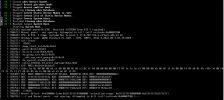Hi,
I am relatively new to Proxmox. About 3 weeks ago I migrated about half a dozen VMs that I had running on a Hyper-V setup on my desktop PC over onto to a Proxmox (8.2.4) dedicated machine I had built. I run my business on these VMs so they are critical to me.
Today, after 19 days of flawless running I noticed a strange performance drop off with no obvious reason (basically my 14700 CPU clocks weren't getting anywhere near max) - anyway, because it made no sense - I decided to reboot the node. This was when the trouble started. One of the VMs didn't start (Oracle Linux 9.4) and was just burning its two CPU cores. I took the attached screenshot from the console. I tried a few things in rescue mode, but quickly decided to restore a backup. Which didn't fix the issue.
Fortunately I had kept all my old Hyper-V VMs switched off, and this VM contains no user data - so I am back up and running with the luxury of time to work out what happened, how to fix it, and how to stop it happening again.
I do backup all the data and code that I write for my platform, however configuring some of these VMs is quite a big job, and this whole "your backups are useless" type failure scares the #$!# out of me!
I would be really appreciative of any help anyone can give.
Thanks
Ralph
I am relatively new to Proxmox. About 3 weeks ago I migrated about half a dozen VMs that I had running on a Hyper-V setup on my desktop PC over onto to a Proxmox (8.2.4) dedicated machine I had built. I run my business on these VMs so they are critical to me.
Today, after 19 days of flawless running I noticed a strange performance drop off with no obvious reason (basically my 14700 CPU clocks weren't getting anywhere near max) - anyway, because it made no sense - I decided to reboot the node. This was when the trouble started. One of the VMs didn't start (Oracle Linux 9.4) and was just burning its two CPU cores. I took the attached screenshot from the console. I tried a few things in rescue mode, but quickly decided to restore a backup. Which didn't fix the issue.
Fortunately I had kept all my old Hyper-V VMs switched off, and this VM contains no user data - so I am back up and running with the luxury of time to work out what happened, how to fix it, and how to stop it happening again.
I do backup all the data and code that I write for my platform, however configuring some of these VMs is quite a big job, and this whole "your backups are useless" type failure scares the #$!# out of me!
I would be really appreciative of any help anyone can give.
Thanks
Ralph


